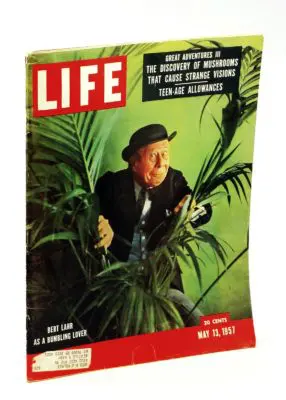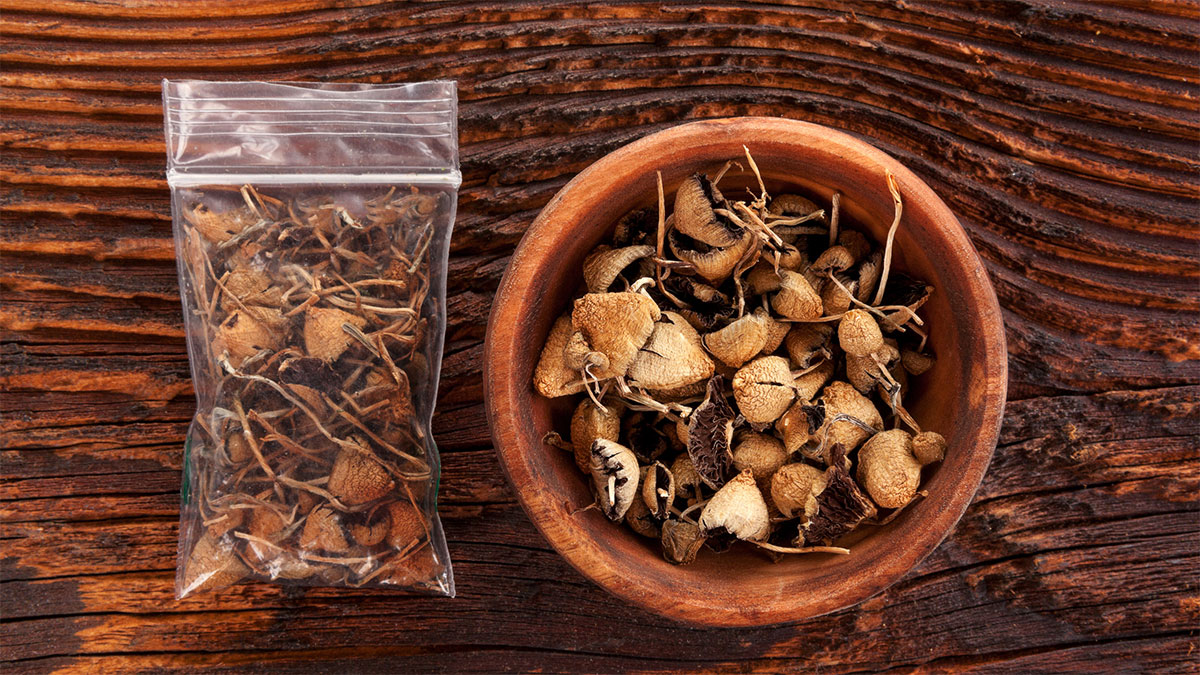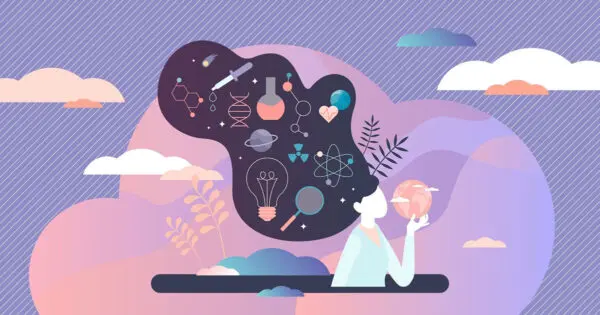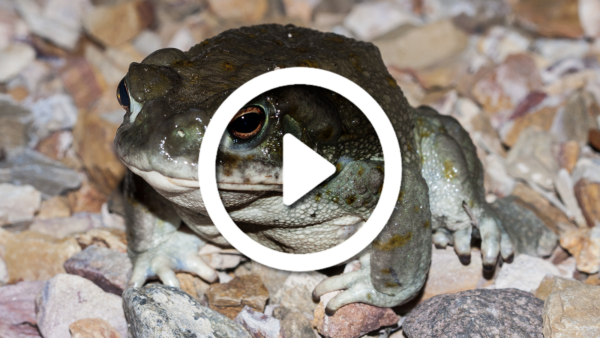Medical Editor: Dr. David Cox, PhD, ABPP
Curious about psilocybin? Our complete psilocybin guide provides insights into its effects, dosages, and potential benefits for a transformative journey.
Psilocybin is a naturally occurring psychoactive compound that can be found in over 200 species of mushrooms. Its chemical structure closely resembles serotonin. Psilocybin has become increasingly popular in recent years for its ability to provide intense spiritual and mystical experiences through the ingestion of “magic mushrooms” derived from this species of fungi.
Psilocybin is currently listed as a Schedule 1 drug and is illegal in the United States and most other countries, but continued research on its medicinal and therapeutic effects may eventually change that status. Here’s everything you need to know about this fascinating substance.
What are magic mushrooms?
“Magic mushrooms” are a type of mushroom that contains psilocybin. This psychedelic substance gives magic mushrooms their hallucinogenic effects. Magic mushrooms can be found in different parts of the world, including Mexico, Asia, and Australia. There are more than 200 species of these fungi. They typically grow out of decomposing plant matter such as dung or wood chips.
Psilocybin has a long history of therapeutic use and has been used by indigenous cultures for thousands of years. This psychedelic drug was used for healing, spiritual and religious ceremonies, and other purposes by many ancient cultures in Central and South America. It wasn’t until the 1950s that psilocybin gained notoriety in modern western medicine when the businessman and scientist R. Gordon Wasson brought psilocybin mushrooms back from a trip to Mexico. He shared a sample with scientist Albert Hofmann—also known for discovering the psychedelic properties of LSD—who was able to isolate the psychedelic compound in the mushrooms. Since then, numerous studies have been done on the effects of psilocybin and its potential medicinal and therapeutic benefits.
The term “magic mushroom” gained mainstream popularity after the 1957 release of a LIFE Magazine article entitled “Seeking the Magic Mushroom,” where Wasson recounted his experiences with the substance.

How does psilocybin work with the body and brain?
Psilocybin is a psychedelic compound that works through the stimulation of serotonin levels in the brain. Serotonin is a hormone that is produced by the body and is responsible for helping to regulate mood, feelings of well-being, and happiness, as well as helping to regulate sleep, digestion, and other bodily functions. Because serotonin levels play a key role in mood disorders like anxiety and depression, psilocybin has been studied as a treatment for anxiety and depression.
So what does a magic mushroom trip feel like? Psilocybin mushrooms are hallucinogenic that affect the brain’s prefrontal cortex. The prefrontal cortex is responsible for abstract thinking, thought analysis, mood, and perception, among other things. And while outcomes will be different for each user based on their body chemistry as well as mindset and the setting in which the drugs are taken, studies, as well as anecdotal data, suggests that many users report feelings of euphoria and even transcendence or mystical experiences. Colors and sounds may appear sharpened or heightened as one begins to notice changes in perception of their surroundings. Users may begin to feel a sense of openness and connection to the world, as well as a strong connection to their thoughts and feelings.
It is possible, though unlikely in most cases, to have a “bad trip” while under the influence of psilocybin mushrooms. While the idea of openness and feelings of connection to one’s thoughts and feelings may seem like a good thing, it can also lead to increased feelings of anxiety or intense reactions to one’s thoughts.
The long-term effects of psilocybin use are still being studied and require more research. A 2020 study published in Scientific Reports indicated that the positive effects of psilocybin lasted for up to one month after users were given a single dose of psilocybin. The study indicated that emotions and brain function as a response to both positive and negative stimuli were altered long after the psilocybin had left the user’s body. Elsewhere, even longer post-treatment improvement has been reported. This is an indicator that psilocybin mushrooms could have long-term benefits for those interested in treating mood disorders.
Benefits of Psilocybin
Studies by Johns Hopkins Medicine show that ingesting psilocybin alongside psychotherapy significantly reduced symptoms in people with major depressive disorder, and relieved anxiety and depression in those with end-of-life cancer diagnoses. Moreover, these studies showed that depression symptoms were relieved more quickly than by other treatments for depression. One study showed that 67% of participants showed more than a 50% reduction in symptoms after just one week. This number increased to 71% of participants after four weeks.
There is limited research on the effects of psilocybin as a treatment for alcohol misuse, although some studies have shown promising results and justify the need for funding to conduct larger clinical trials. Similarly, limited studies have been done on the use of psilocybin for treatment-resistant tobacco and nicotine dependence. The results were similar to that of the alcohol-dependence studies and indicated promising results that warrant additional research.
How to Take Psilocybin
There are several different ways to ingest mushrooms. Some people choose to eat them whole, although the general opinion is that they don’t taste great. To mask the taste, other options are to grind the dried mushrooms and blend them into smoothies or juices, or even place the ground mushrooms into capsules. Another option is to brew the mushrooms into tea and drink it. Drinking a mushroom tea will bring on the effects most quickly, and ingesting a capsule will take the longest for effects to show up.
Before taking magic mushrooms, a user should make sure to have plenty of time set aside. The effects of psilocybin can usually be felt for up to six hours, with the peak happening around 2-3 hours after ingestion. If a user has never taken mushrooms before, they should leave the whole day free of responsibilities to ensure ample time for recovery.
It is also important to take the proper dose. A first-time user should start with a small dose. In clinical settings, a common dose ranges from 15-30 mg. More experienced users may choose to increase the dosage, but starting with a low dose is usually a safer decision.
What to expect on a trip?
During a psilocybin experience, one can expect to experience perceptual changes such as visual halos around lights and objects, vivid colors, distorted vision, emotional shifts, and a distorted sense of time. Users may also experience heightened thoughts and emotions. One may feel more connected to nature or the universe, their loved ones, and oneself. Many users report feeling a sense of peace and openness.
Physical side effects can vary from person to person. Some users report feeling nauseous in the first 60-90 minutes after ingestion, although ingesting the mushrooms in tea form may reduce nausea. Additional physical symptoms may include changes in heart rate or blood pressure, restlessness or arousal, or trouble with coordination.
How long will a trip last?
A magic mushroom trip typically lasts somewhere between 4-6 hours, with the peak of the trip occurring 2-3 hours after ingestion. In the first hour or so of the trip, some users may have mild feelings of anxiety and may wonder if the mushrooms are providing the intended effects. It is important not to take an additional dose, as this may lead to unintended results. During the peak of the trip is when a user will feel the most intense sensory and psychological alterations. This is a good time to relax and lean into whatever feelings or perceptions may arise. As users begin to come down from the trip they are likely to experience a gradual decrease in effects.
The day after a trip may leave users feeling tired. In the days and even weeks after a trip, one may still feel some lasting effects, including improved mood and openness to others. The effects of a magic mushroom trip may even last for years. In a study at Johns Hopkins Medical Center, 94% of patients who took psilocybin reported the experience to be “one of the top five most meaningful experiences of their lives.” Furthermore, the friends, family members, and colleagues of the patients also reported noticing that the patients were happier, calmer, and kinder—even after 14 months.
Risks and Possible Side Effects
Research continues on the benefits, risks, and possible side effects of psilocybin use. A 2010 study analyzed data gathered from eight double-blind placebo-controlled studies conducted between 1999 and 2008 that included 110 healthy subjects who received oral doses of psilocybin. The analysis found that dysphoria, anxiety, and panic occurred only in the two highest dose conditions, and even then, only in a small number of subjects. Most patients in the studies reported pleasant experiences. The analysis found that “the administration of moderate doses of psilocybin to healthy, high-functioning and well-prepared subjects in the context of a carefully monitored research environment is associated with an acceptable level of risk.”
Even in uncontrolled, recreational settings, anecdotal data suggests that most experiences with psilocybin are positive and produce little to no long-term negative effects. When taking psilocybin recreationally and in a non-clinical setting, finding a safe and comfortable setting reduces the risk of experiencing a bad trip. For more information on preparing for a psychedelic experience see this article on set and setting.
Can you overdose on magic mushrooms?
More research needs to be done before a definitive answer can be concluded, but according to the Drug Policy Alliance, the “risk of fatal overdose is virtually non-existent.” Another study indicates that there are very low rates of abuse and no potential for physical dependence.
Conclusion
Of all the psychedelic drugs, mushrooms may very well be the safest and have the lowest risk for negative experiences. Nevertheless, it is always important to equip oneself with the knowledge and best practices needed to ensure the most positive outcome. Users should always take the time to prepare themselves for a psychedelic experience and respect the process. When using psilocybin for medicinal purposes it is worthwhile to have access to a trained psychotherapist to provide guidance and support.









